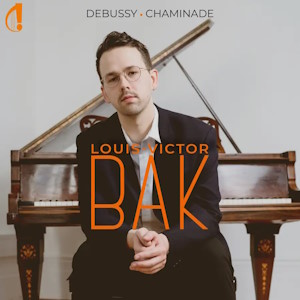
Claude Debussy (1862-1918)
Images Book 1 (1905)
Images Book 2 (1907)
Cécile Chaminade (1857-1944)
Sonata in C minor Op.21 (1895)
Impromptu No.5 from 6 Études de concert Op.35 (1886 or earlier)
Louis-Victor Bak (piano)
rec. 2023, St. George’s Headstone, Harrow, UK
Indésens Calliope ICO52 [49]
It is odd to think that Debussy lived, composed and died, all within the lifetime of the rather unsung Cécile Chaminade, a composer/pianist who was still writing in her romantic idiom in the quarter of a century after Debussy’s death. It is easy to dismiss her in that respect alone, and she has been dismissed as a salon composer for many years though her music was extremely popular and well recorded in her lifetime. A forthcoming APR release highlights thirteen of the pianists who recorded her music in the first half of the twentieth century, all but one in her lifetime.
Debussy’s music of course has only grown in stature as the years pass. His two books of Images have been recorded often, presenting young pianists a stiff challenge though Bak rises rather well to that challenge. For the most part he has a sure grasp of the ebb and flow of the music and avoids the heaviness that is sometimes felt in mouvement while maintaining its motoric drive. Occasionally he sounds a little matter of fact, the opening page of Cloches à travers les feuilles for example though he makes up for that in the un peu animé et plus clair and beyond. His pedalling in et la lune descend sur le temple qui fut and indeed throughout this recital is well considered and if I had one niggle it is that I miss a real pianissimo, a marking that, along with many ppp indications is found on nearly every page. On first hearing the two sets, I felt it was all a little too grand. Though I have adjusted that as I got to know the recording better, there are still moments, such as the end of Reflets dans l’eau or the final bars of mouvement that call for a fading into the distance, une sonorité harmonieuse et lointaine as Debussy writes in Reflets, that isn’t fully achieved. That said, these are performances that I enjoyed listening to.
Chaminade’s name may still be known but she is considerably less familiar than her countryman. Her father considered it improper for her to attend the Paris conservatoire but allowed her to take private lessons with Félix Le Couppey (1811-1887) and Benjamin Godard (1849-1895) both of whom taught at the conservatoire. She toured extensively as a pianist to great acclaim though her recitals consisted entirely of her own music; with over two hundred pieces for the piano alone she was not short of material and many of her works became favourites, the scarf dance, Pierette, the Air de Ballet op.30 among them. Even today we sometimes get to hear her étude Automne (I heard Stephen Hough play it in recital just last night as it happens). Bak plays a less familiar étude from the op.35 set, the impromptu with its mix of broadly lyrical and impishly scherzo-like sections. Bak excels in bringing out the sparkling humour of Chaminade’s arabesques.
The Sonata is rather unusual amongst her piano works, as she otherwise avoided larger scale items – even her later variations on an original theme comes in at under nine minutes. Imslp.org gives the sonata’s composition date as 1895 though this would put it as a decade after the op.35 études; perhaps this was when it was first published? It is certainly a relatively early work. The first of its three movements is a rather odd amalgam of Beethoven like drama with the opening left hand rising theme, contrapuntal writing and Chaminade’s own melodic gifts for its lyrical second theme. The dramatic close to the work has already been played within a minute of the first note which seems to take away from the ultimate climax somewhat though the quality of the piano writing cannot be faulted. The second movement has themes that are both rather touching but equally lend themselves to the grandeur that Chaminade calls for. This is Chaminade at her best for me. The brief finale is a toccata that never loses its forward momentum and drive even in its quieter passages.
Bak’s Debussy may not be my first choice but there is still a lot to recommend it and he seems right at home in Chaminade’s music. The sound is first rate and despite the booklet photo which shows him sitting at a Pleyel he plays a Steinway which sounds wonderful. All in all, a very decent debut disc.
Rob Challinor
Buying this recording via a link below generates revenue for MWI, which helps the site remain free



















